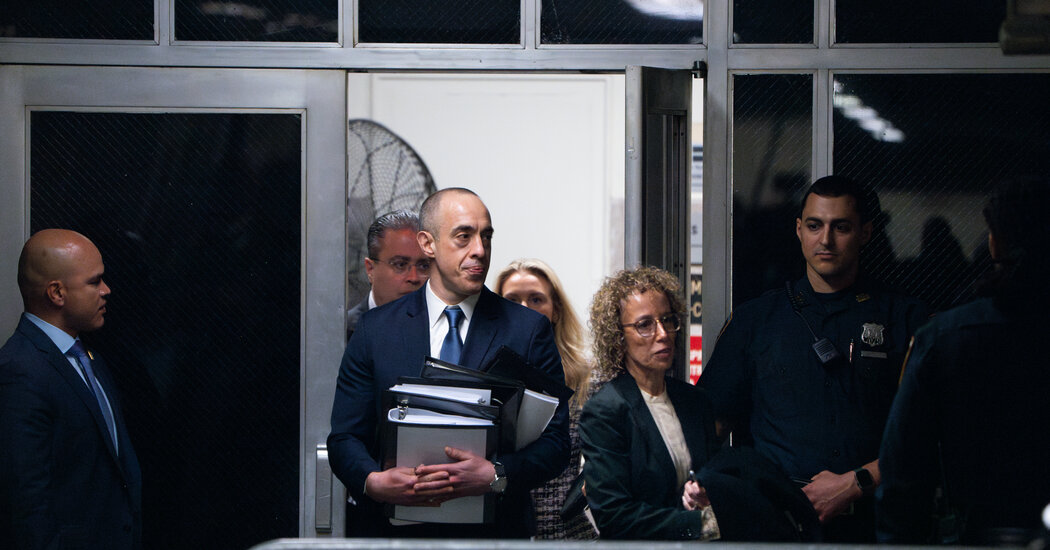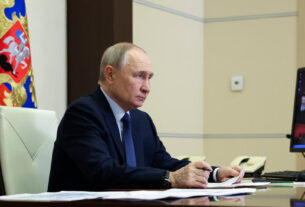The Senate on Thursday narrowly confirmed Kash Patel as the next director of the F.B.I., installing a hard-line critic of the bureau whose unwavering loyalty to President Trump has raised questions over the independence of the nation’s most powerful law enforcement agency.
The 51-to-49 vote, with two Republican defections, means that Mr. Patel will now oversee the vast surveillance and investigative powers of the F.B.I., whose mission is seeking out the truth even if it angers the president. As its director, Mr. Patel will take over as the bureau has entered a particularly turbulent period, with the forced departures of some of its top officials.
Democrats in the Senate had hoped to slow his nomination, citing Mr. Patel’s repeated promises to enact a campaign of revenge on Mr. Trump’s behalf, his pledge to reshape the agency and his refusal to say that Mr. Trump lost the 2020 election. But they had little success swaying their colleagues across the aisle, who are wary of eliciting the political wrath of Mr. Trump or his powerful allies like Elon Musk.
This month, Senator Richard J. Durbin of Illinois, the top Democrat on the Judiciary Committee, accused Mr. Patel of improperly directing a slew of forced departures at the bureau without having been confirmed as its leader. Mr. Durbin added on Thursday that Mr. Patel’s apparent involvement stood at odds with his claim during his hearing that he was unaware of any political retribution at the F.B.I. that was unfolding as he testified.
Mr. Patel’s financial disclosures also raised eyebrows, but none of those concerns substantially shifted his support, allowing him to essentially glide through the confirmation process.
In the end, two Republicans opposed Mr. Patel’s nomination, Senator Lisa Murkowski, a centrist from Alaska, and Senator Susan Collins of Maine.
Ms. Collins pointed to the recent upheaval across the Justice Department, including the F.B.I.
“There is a compelling need for an F.B.I. director who is decidedly apolitical,” she said in a statement released before the vote. “While Mr. Patel has had 16 years of dedicated public service, his time over the past four years has been characterized by high-profile and aggressive political activity.”
On the floor, Senator John Thune, Republican of South Dakota and the majority leader, praised Mr. Patel, saying he looked forward to working with him “to restore the integrity of the F.B.I. and get it focused on its critical mission.”
At Mr. Patel’s confirmation hearing last month, Democratic senators pressed him about incendiary comments he had directed at the F.B.I., including a so-called enemies list published at the end of his book, “Government Gangsters.” Mr. Patel disputes that description, calling it “a total mischaracterization.”
Regardless, Republicans eagerly embraced Mr. Patel, who played down his more bombastic statements
“I have no interest, no desire, and will not, if confirmed, go backwards,” he said in his testimony. “There will be no politicization at the F.B.I. There will be no retributive actions taken by any F.B.I., should I be confirmed as the F.B.I. director.”
He later promised, “There should be no politics in the F.B.I.”
In an earlier era, Mr. Patel would have had trouble surviving the confirmation process, but Mr. Trump and his loyalists see him as a disrupter who will weed out supposed anti-conservative bias and shake up the bureau’s culture. Their hostility toward the agency stems largely from the investigations it opened into Mr. Trump, including his 2016 presidential campaign and its potential ties to Russia; his handling of classified documents after he left office; and his effort to overturn the results of the 2020 election.
Mr. Patel has repeatedly cast aspersions on the Russia investigation. To portray the inquiry as politically motivated, he has falsely described the facts and circumstances by which the F.B.I. decided to open it.
Mr. Patel’s confirmation comes as deep anxiety has rippled across the F.B.I., with the Trump administration moving swiftly to impose its will on the agency. Since Mr. Trump took office, his appointees have forced out several F.B.I. executives and demanded a list of employees who worked on the investigations into the Jan. 6, 2021, attack on the Capitol.
Emil Bove III, the department’s interim No. 2, has already clashed with the bureau’s acting director and deputy, accusing them of insubordination for refusing to turn over names of F.B.I. personnel whom many fear could be fired for simply investigating violations of federal law.
Even as Mr. Patel vowed during his hearing that his tenure would not be guided by politics, the Justice Department has dismissed a wave of prosecutors who worked on cases involving Mr. Trump or the Jan. 6 attack and established a so-called weaponization working group. Mr. Bove’s demand that the Justice Department move to drop charges against Mayor Eric Adams of New York because the case hindered Mr. Adams’s cooperation on immigration prompted at least seven career prosecutors to resign last week.
An early signal of how closely Mr. Patel will stick to his promises, agents believe, is whether he permanently installs the acting deputy director, Robert Kissane, and allows the acting director, Brian Driscoll, to return to Newark, where he ran the field office. If Mr. Patel ousts both men, he is likely to fuel further suspicion that he will act as an extension of the White House.
As the ninth director of the F.B.I., Mr. Patel would oversee a vast global operation of about 38,000 employees with a proposed 2025 fiscal budget of more than $11 billion. In leading the agency, he would be asked to protect the country from terrorism, dangerous criminals and political corruption, along with the threats posed by global rivals like China and Russia.
A former trial lawyer in the Justice Department’s national security division, Mr. Patel worked as a congressional investigator and then bounced around national security jobs in quick succession in the previous Trump administration, including serving as the senior director for counterterrorism at the National Security Council.
Given his relative lack of experience, Mr. Patel had hoped to lean on a group of former agents who were brought to the F.B.I. to form a director’s advisory team. But that group has already shrunk. Two of them, former senior executives, have bailed on Mr. Patel because of the upheaval.
Former officials said the advisory team had been gathering information about accountability, information technology, organizational structure and leadership selection. Two members — Gregory Mentzer and Tom Ferguson — were former supervisory agents but never held senior jobs or ran significant parts of the organization.
Another former agent, Michael Clarke, was believed at one point to be joining the team, former officials said. Mr. Clarke was the lead F.B.I. agent in the 2012 attack on a diplomatic compound and C.I.A. annex in Benghazi, Libya, that killed four Americans. Mr. Patel worked on the Benghazi investigation when he served as a prosecutor in the Justice Department.
More recently, a young special agent from Seattle has joined the advisory team, former and current officials said. That agent worked in the White House and as a staff member on the National Security Council in Mr. Trump’s first term. A Facebook post showed him in the Oval Office, grinning and flanking Mr. Trump, who sat at the Resolute Desk, his hands clasped.
Mr. Patel has also embraced politics in an extraordinary departure from the post-Watergate era, when nominees sought to be seen as politically neutral. In a lengthy questionnaire completed before his confirmation hearing, Mr. Patel acknowledged that he had served as a surrogate for Mr. Trump’s re-election campaign for about two years.
Andrew G. McCabe, the former F.BI. deputy director, drew outrage among former and current F.B.I. agents, as well as Republicans, for being photographed wearing a T-shirt supporting his wife’s campaign when she ran unsuccessfully for a seat in the Virginia State Legislature in 2015.
Indeed, Jeff Sessions, Mr. Trump’s first attorney general, brandished the picture during Mr. McCabe’s interview to succeed James B. Comey as F.B.I. director after he had been fired. Mr. Sessions insisted the image was potentially disqualifying.
Mr. Patel’s predecessor, Christopher A. Wray, shunned politics, seeking to avoid even the perception of bias. Mr. Wray never met alone with either Mr. Trump or President Biden, in part to fend off accusations that he was doing the bidding of the White House.





